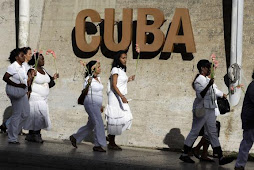Moves to capitalise on Cuba's wealth of scientific expertise
John Paul Rathbone
Technically, it is called a skills mismatch, and Cuba has it in
abundance. Take the Havana taxi driver who tells you he is in fact a
surgeon, or the waitress who is, in fact, a physicist.
Skill mismatching represents the cost of misinvested human capital, and
thus economic inefficiency. But the state and some foreign investors
want to turn it into a boon, and the ground source of a future
"knowledge economy".
"Cuba's knowledge economy is stronger than people often credit," says
Faquiry Diaz Cala, a Cuban entrepreneur now living in the US. "It has
one of the hemisphere's highest literacy rates, one of the highest
college graduate rates, and PhDs in hard sciences . . . One should think
of Cuba as a start-up nation, with some similarities to Israel."
Even if the comparison is a big stretch, Cuba's health sector holds
immediate promise and other sectors, such as computing, have also drawn
foreign interest.
The government has made medical services a money spinner: some 12,000
Cuban doctors work abroad in Africa, 30,000 in Venezuela and about
12,000 in Brazil and elsewhere in Latin America.
Their services are sold by Cuba, which pays the doctors a smaller
fraction. This brings in billions of dollars a year — a system critics
call a tacit form of indentured labour, although medics earn more abroad
than at home and enjoy perks on their return. Some reportedly bribe
officials to bump them up waiting lists to go.
Now, foreign health groups want to get in on Cuba's commercially
untapped pharmaceutical expertise. In May, US research centre Roswell
Park agreed to begin clinical trials on a Cuban-developed lung cancer
vaccine, Cimavax.
"We know [the drug] is not an easy one to develop clinically," said
Philippe Pouletty, chairman of French biotech company Abivax. "But it is
good news that a US cancer institute evaluates it and that the FDA [US
Food and Drug Administration] builds confidence in Cuban products."
Abivax has operated in Cuba for five years, building relationships with
research institutes, using investments and agreements to trial and
commercialise Cuban drugs — such as a vaccine to help chronic hepatitis
B sufferers — and also to develop new drugs.
Mr Pouletty, a venture capitalist and qualified doctor, says that if
Cuba's biotech capability was floated into a listed company, it might be
worth $20bn. But he stresses: "We don't think it is the biggest cheque
that persuades the Cubans. They are looking for sustainable growth;
short-term, medium-term and particularly long-term solutions."
He says Cubans are slowly feeling their way into new language such as
"spin-offs", and are still getting used to notions such as foreign joint
ventures requiring them to surrender full control.
One should think of Cuba as a start-up nation, similar to Israel
- Faquiry Diaz Cala, entrepreneur
Tweet this quote
But he adds that he is "pathologically optimistic" and points to a new
"SiliCuban" advisory board, designed to help Cubans develop their drug
industry and "where all things can be said without censorship". Another
positive sign is the separation three years ago of the three main
research institutes into a holding group, BioCubaFarma, a move that
freed them from the Ministry of Health's heavy bureaucratic hand.
Computer programming is also promising. Local computers are so old and
slow that Cubans have become adept at writing lean software programs
that require little memory to run —a skill ideal for writing mobile
apps. The state has commercialised some of this expertise through Datis,
which sells computing and internal security expertise to allies such as
Venezuela that use it for administration, such as identity cards.
Privately harnessing such knowledge is another matter. Difficulties are
compounded by poor internet availability, a barometer of Cuba's
willingness to embrace the "knowledge economy".
The government says it wants half the population wired by 2020, to boost
productivity. Yet it is reluctant to permit such a powerful tool as it
would mean ceding control. There have been small trials of public WiFi,
but most Cubans can only get online for $4.50 an hour at internet cafés
in hotels, a quarter of the average monthly state wage.
On a recent visit to Miami, organised by the Cuba Study Group, a US
organisation that promotes US-Cuban engagement, island entrepreneurs
were agog at the possibilities of online retail and rued Cuba's poor
connectivity. Airbnb's Cuban operations, for example, are often run by a
relative abroad, who communicates internet bookings with the guesthouse
operator via telephone or SMS.
Source: Moves to capitalise on Cuba's wealth of scientific expertise -
FT.com -
http://www.ft.com/cms/s/0/1bbed3ee-fb0e-11e4-9aed-00144feab7de.html#axzz3dDA5UmG0
Subscribe to:
Post Comments (Atom)





No comments:
Post a Comment